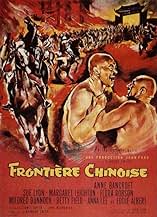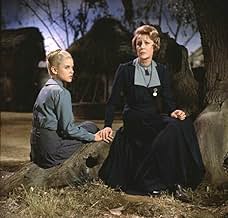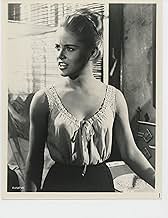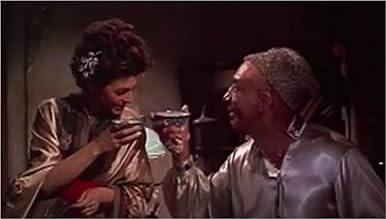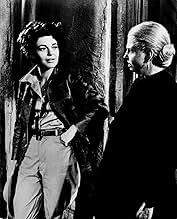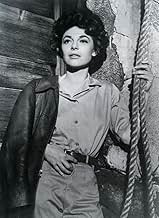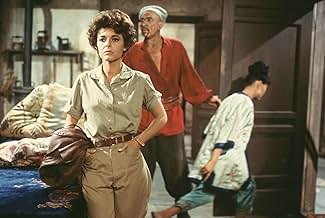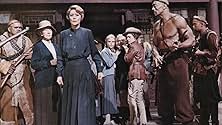In 1935 China, seven dedicated missionary women try to protect themselves from the advances of a barbaric Mongolian warlord and his cut-throat gang of warriors.In 1935 China, seven dedicated missionary women try to protect themselves from the advances of a barbaric Mongolian warlord and his cut-throat gang of warriors.In 1935 China, seven dedicated missionary women try to protect themselves from the advances of a barbaric Mongolian warlord and his cut-throat gang of warriors.
- Director
- Writers
- Stars
- Awards
- 1 nomination total
Lee Kolima
- Warrior
- (uncredited)
- Director
- Writers
- All cast & crew
- Production, box office & more at IMDbPro
6.72.9K
1
2
3
4
5
6
7
8
9
10
Featured reviews
Quite an ending
John Ford ended his narrative feature filmmaking career with something different, a story about women instead of men. It's a bit of a mixed bag of a film, showing a lot of the errant storytelling that had become more prevalent of Ford's film in his final decade, but a surprisingly stark ending helps elevate the material in a way that I had not been expecting. Reminding me of how Hitchcock went out with Family Plot, a smaller, lesser film that still managed to entertain while also demonstrating the strengths the filmmaker had developed over the decades.
In a remote mission in rural China, a group of women and one man teach the local children English and in the ways of Christ. One of them, Florrie (Betty Field), is pregnant, nearly due, and having been brought to the mission by her husband Charles (Eddie Albert). The head of the mission, Agatha (Margaret Leighton), has seen the need for a doctor, so she has arranged for the arrival of Dr. D. R. Cartwright (Anne Bancroft), who happens to be a woman, a twist Agatha had not foreseen. What seems like the undergirding conflict of the film will be between the deliriously religious Agatha against the sardonically secular Dr. Cartwright. It never really comes to fruition, though. It's set up so that Agatha and Dr. Cartwright will be duking it out rhetorically and morally for the soul of young Emma (Sue Lyon), the youngest of the missionaries.
What happens instead is a sudden outbreak of cholera after the battle lines of personality have been drawn. With the encroaching march of the Mongolian warlord Tunga Khan (Mike Mazurki), another British mission has abandoned their location and fled to the mission led by Agatha. With them came cholera, and Dr. Cartwright takes charge. She's assertive and action oriented, getting the mission moving in a way that can deal with the outbreak with minimal loss of life, and then it's suddenly over. We go from one scene where the outbreak is on the verge of being taken care of to a celebratory dinner (that Agatha insists on making dour while Cartwright insists on breaking open a bottle of scotch to celebrate) in a cut. I thought it was going to be a running plot element through the rest of the movie, and then it was suddenly over. Okay. Moving on.
That's the first half of the movie, and it's far from great. As a story unto itself, it's oddly built and unsatisfying. As the first half of what comes next, it's still curious but the basic story elements of Cartwright's character, the pregnancy, and the setting have been established well enough to go into what seems to become the point of the film. Tunga Khan arrives with his horde and takes up residence in the mission, Charles having been killed in the village when he tried to help a young girl being raped. He shoves the women into a wooden shed, and Cartwright needs to take charge as much as she can, especially when Florrie goes into labor. Cartwright becomes the face of the women when negotiating with Tunga Khan, offering up her own body as ransom for her medical supplies, hot water, and food.
It would have been better had Cartwright's character been a greater focus of the first half, though. There's little about why she came to rural China for a job. She talks about how women doctors aren't given opportunities to work and that she was also running from a failed relationship with a married man, but that's about it. I don't think enough is given to her early to make these early decisions terribly impactful. It's a strong moment from Bancroft, carrying the weight of her decision well, but I just think it could have been better set up.
This moves us into the film's finale where Cartwright essentially becomes Tunga Khan's prize, his queen. A good thing about this later section of the film is Khan himself. There's no good side to Khan. He's a barbarian and a monster, unrepentant about his crimes and even kills one of his own men (Woody Strode) in one-on-one combat just because. There's no negotiating with this man, no appealing to his humanity. His interest in human life is only what can profit him. So, Cartwright does what she can to provide the freedom of the other women, the titular seven. She gives herself fully to him.
Now, up to this point, I was kind of seesawing back and forth about the movie's worth as a whole, but then the final scene happened. I loved it. It was an ending both dark and hopeful at the same time. It goes to a place with Cartwright that feels just right after what she had gone through and seen in the second half. I think it saves the movie.
I've felt a certain fatigue in Ford's work as his career came to an end, but despite that exhaustion he still manages a solid little tale with his final narrative feature film. It may take until the final moments to push it to that level, but it does get there in the end.
In a remote mission in rural China, a group of women and one man teach the local children English and in the ways of Christ. One of them, Florrie (Betty Field), is pregnant, nearly due, and having been brought to the mission by her husband Charles (Eddie Albert). The head of the mission, Agatha (Margaret Leighton), has seen the need for a doctor, so she has arranged for the arrival of Dr. D. R. Cartwright (Anne Bancroft), who happens to be a woman, a twist Agatha had not foreseen. What seems like the undergirding conflict of the film will be between the deliriously religious Agatha against the sardonically secular Dr. Cartwright. It never really comes to fruition, though. It's set up so that Agatha and Dr. Cartwright will be duking it out rhetorically and morally for the soul of young Emma (Sue Lyon), the youngest of the missionaries.
What happens instead is a sudden outbreak of cholera after the battle lines of personality have been drawn. With the encroaching march of the Mongolian warlord Tunga Khan (Mike Mazurki), another British mission has abandoned their location and fled to the mission led by Agatha. With them came cholera, and Dr. Cartwright takes charge. She's assertive and action oriented, getting the mission moving in a way that can deal with the outbreak with minimal loss of life, and then it's suddenly over. We go from one scene where the outbreak is on the verge of being taken care of to a celebratory dinner (that Agatha insists on making dour while Cartwright insists on breaking open a bottle of scotch to celebrate) in a cut. I thought it was going to be a running plot element through the rest of the movie, and then it was suddenly over. Okay. Moving on.
That's the first half of the movie, and it's far from great. As a story unto itself, it's oddly built and unsatisfying. As the first half of what comes next, it's still curious but the basic story elements of Cartwright's character, the pregnancy, and the setting have been established well enough to go into what seems to become the point of the film. Tunga Khan arrives with his horde and takes up residence in the mission, Charles having been killed in the village when he tried to help a young girl being raped. He shoves the women into a wooden shed, and Cartwright needs to take charge as much as she can, especially when Florrie goes into labor. Cartwright becomes the face of the women when negotiating with Tunga Khan, offering up her own body as ransom for her medical supplies, hot water, and food.
It would have been better had Cartwright's character been a greater focus of the first half, though. There's little about why she came to rural China for a job. She talks about how women doctors aren't given opportunities to work and that she was also running from a failed relationship with a married man, but that's about it. I don't think enough is given to her early to make these early decisions terribly impactful. It's a strong moment from Bancroft, carrying the weight of her decision well, but I just think it could have been better set up.
This moves us into the film's finale where Cartwright essentially becomes Tunga Khan's prize, his queen. A good thing about this later section of the film is Khan himself. There's no good side to Khan. He's a barbarian and a monster, unrepentant about his crimes and even kills one of his own men (Woody Strode) in one-on-one combat just because. There's no negotiating with this man, no appealing to his humanity. His interest in human life is only what can profit him. So, Cartwright does what she can to provide the freedom of the other women, the titular seven. She gives herself fully to him.
Now, up to this point, I was kind of seesawing back and forth about the movie's worth as a whole, but then the final scene happened. I loved it. It was an ending both dark and hopeful at the same time. It goes to a place with Cartwright that feels just right after what she had gone through and seen in the second half. I think it saves the movie.
I've felt a certain fatigue in Ford's work as his career came to an end, but despite that exhaustion he still manages a solid little tale with his final narrative feature film. It may take until the final moments to push it to that level, but it does get there in the end.
The final film of a great director that never lost his faith in human nature
John Ford, usually with the reputation of misogynist, directed his last film surrounded by strong female characters and where the male characters are not particularly relevant. The movie is set in China, 1935, where a Civil War is taking place. Anne Bancroft, a female doctor who is also an atheist, says: "I spent years in slum hospitals. I never saw God come down and take care of anyone". Ford, with his catholic roots, allows himself to be pessimistic. Even when Margaret Leighton, a supposed strong believer is confronted by the female doctor, she says: "I've always searched for something that... isn't there. And God is not enough. God help me - He isn't enough".
The title refers to seven women, but the fact is that there are eight: What led us to believe that Anne Bancroft is excluded from the beginning? She wears man's clothes, she smokes and drinks. The loner Bancroft, condemned to always walk alone, like Ethan Edwards in "The Searchers". And what about the final scene, with a rare beauty, where the viewer isn't allowed to watch her fall? She is dressed in woman's clothes for the first time and is prepared to a truly catholic gesture, the sacrifice. "Seven Women" is a beautiful film, almost perfect. Towards the end, we become aware that Mr. Ford will live eternally.
The title refers to seven women, but the fact is that there are eight: What led us to believe that Anne Bancroft is excluded from the beginning? She wears man's clothes, she smokes and drinks. The loner Bancroft, condemned to always walk alone, like Ethan Edwards in "The Searchers". And what about the final scene, with a rare beauty, where the viewer isn't allowed to watch her fall? She is dressed in woman's clothes for the first time and is prepared to a truly catholic gesture, the sacrifice. "Seven Women" is a beautiful film, almost perfect. Towards the end, we become aware that Mr. Ford will live eternally.
Anne Bancroft stars in John Ford's last film.
For a film nut like me. 7 Women offers a plethora of pleasures. Patricia Neal was suppose to star but ill health made her unavailable. Anne Bancroft took over as the drinking, smoking, swearing saint. and all the aspects of this complex character are totally real in Anne Bancroft's face. She arrives to the Mission in China like a benevolent tornado. The spectacular Margaret Leighton is the head of the Mission and she plays it like a raw nerve, Among the other women, Flora Robson, Queen Elizabeth to Laurence Olivier's Michael Ingolby in Fire Over England, brings a voice of reason that reassure us, Betty Field , Kim Novak's mother in Picnic, among a gallery of memorable characters, plays the pregnant middle age woman who offends the Christian mission for having had sex with her husband under their roof. Mildred Dunnock, Anna Lee and even Stanley Kubrick's Lolita, Sue Lyon is part of the Mission. On the other side, the villains, that offended so many people, John Ford casts his longtime companion Woody Strode. I understand and even accept all the criticisms listed in the reviews of this pages but, somehow, I can put all that aside and enjoy the plethora of pleasures that it offers.
A great swansong from Ford
I wonder what feminists feel about this film. I found this work to be a fascinating look at women by a male director that can compare with two other cinematic works: Paul Mazursky's "The Unmarried Woman" and Muzaffar Ali's "Umrao Jaan". Strong women, weak women, lesbians, and immature girls, are contrasted with cardboard male characters that are never fully developed and are obviously no match to the array of women portrayed in the film. The men are painted so negatively that one begins to wonder if Ford thought Asian men had more brawn than brain--a strange view that has gained currency in Hollywood cinema.
I applaud Ford's decision to cast Anne Bancroft in this role. This is one of her strong performances. She makes even the most vapid films look elegant with her roles ("Lipstick", "Little Nikita", to name just two). Ford develops her role "7 women" on the lines of a Western gunslinger--only there are no gunfights. The woman has a weapon: sex. That weapon can down all the bad guys faster than it takes to down Mexicans, Red Indians, rustlers, bank-robbers. In this film these bad men are Chinese/Mongolian thugs. Established thespians Dame Flora Robson and Margaret Leighton are totally eclipsed by Bancroft's riveting performance.
What Ford wanted I guess was to stun the viewer with the ending--the twist preceded by the gradual softening of the Bancroft in men's clothes to the Bancroft in women's clothes and the acceptance of male superiority. Most critics have found the end facile but I found the end was powerful as it makes you review and reconsider the strength of the lead character.
The film questions established views on religion; evidently Ford was old enough to have seen enough to choose to make this film in the evening of his life. In his films, Ford's women are as interesting as any other aspect of his cinema and this film provides ample fodder for those interested in studying this element of Ford's work.
However, for a 1966 film, the studio sets for the film look too artificial for the serious cinema the film offers. If anything, the film makes the viewer think!
I applaud Ford's decision to cast Anne Bancroft in this role. This is one of her strong performances. She makes even the most vapid films look elegant with her roles ("Lipstick", "Little Nikita", to name just two). Ford develops her role "7 women" on the lines of a Western gunslinger--only there are no gunfights. The woman has a weapon: sex. That weapon can down all the bad guys faster than it takes to down Mexicans, Red Indians, rustlers, bank-robbers. In this film these bad men are Chinese/Mongolian thugs. Established thespians Dame Flora Robson and Margaret Leighton are totally eclipsed by Bancroft's riveting performance.
What Ford wanted I guess was to stun the viewer with the ending--the twist preceded by the gradual softening of the Bancroft in men's clothes to the Bancroft in women's clothes and the acceptance of male superiority. Most critics have found the end facile but I found the end was powerful as it makes you review and reconsider the strength of the lead character.
The film questions established views on religion; evidently Ford was old enough to have seen enough to choose to make this film in the evening of his life. In his films, Ford's women are as interesting as any other aspect of his cinema and this film provides ample fodder for those interested in studying this element of Ford's work.
However, for a 1966 film, the studio sets for the film look too artificial for the serious cinema the film offers. If anything, the film makes the viewer think!
Under-rated Swan Song
"Seven Women" is the last feature film of John Ford, arguably the greatest director the United States has yet produced. After a half century of film making, Ford ended his fabled career with a wide screen feature about women in peril at a Chinese mission. Infirm and alcoholic, he filmed it on an MGM sound stage; MGM then cut it and tossed it away on the bottom half of a double bill.
Today, the film is little known and seldom seen. It is far from Ford's best work, yet there is power and believability in many of the lead performances, and power in the arc of the story. Anne Bancroft shines as a feisty New York doctor who ultimately sacrifices herself to save the other missionaries -- many whom she doesn't agree with -- from brutal deaths at the hands of Chinese bandits. Her work here is more forceful and better realized than her role of Mrs. Robinson, done two years later.
The best gift MGM/Sony could give lovers of serious cinema is a clean print of this forgotten film. Its sets are often glaringly artificial, and some of the secondary players are over the top (an old weakness of Ford's) as well as miscast, but "7W" is a far better film than Hollywood legend has told us.
Today, the film is little known and seldom seen. It is far from Ford's best work, yet there is power and believability in many of the lead performances, and power in the arc of the story. Anne Bancroft shines as a feisty New York doctor who ultimately sacrifices herself to save the other missionaries -- many whom she doesn't agree with -- from brutal deaths at the hands of Chinese bandits. Her work here is more forceful and better realized than her role of Mrs. Robinson, done two years later.
The best gift MGM/Sony could give lovers of serious cinema is a clean print of this forgotten film. Its sets are often glaringly artificial, and some of the secondary players are over the top (an old weakness of Ford's) as well as miscast, but "7W" is a far better film than Hollywood legend has told us.
Did you know
- TriviaAnne Bancroft recalled producer and director John Ford's tearing pages out of the script and described him as "Marvelous but loony."
- GoofsDr. Cartwright's hairstyle is not out of place for 1935. Dr. Cartwright is a strong, independent woman and it is not unusual for her to have this type of hairstyle - see Amelia Earhart. Besides, short hair worn off the shoulder was a very popular style in the 1930s.
- Quotes
Dr. D.R. Cartwright: [to Tunga Khan, Bandit Leader] So long, ya bastard!
- Crazy creditsPROLOGUE: "1935: North China near the border of Mongolia...A land of feudal war lords and marauding bandit armies...A time of lawlessness and violence."
- ConnectionsReferenced in MGM 40th Anniversary (1964)
- SoundtracksJesus Loves Me
(uncredited)
Words by Anna B. Warner and David Rutherford McGuire
Music by William B. Bradbury
Sung by Sue Lyon and the children
- How long is 7 Women?Powered by Alexa
Details
- Release date
- Country of origin
- Languages
- Also known as
- Chinese Finale
- Filming locations
- Production companies
- See more company credits at IMDbPro
Box office
- Budget
- $2,300,000 (estimated)
- Gross worldwide
- $228
- Runtime
- 1h 27m(87 min)
- Color
- Aspect ratio
- 2.35 : 1
Contribute to this page
Suggest an edit or add missing content


